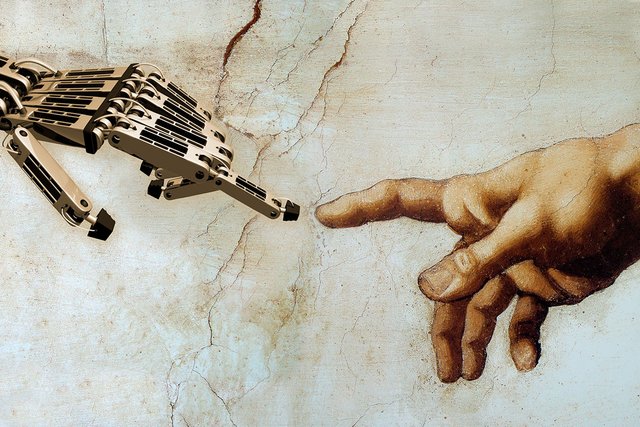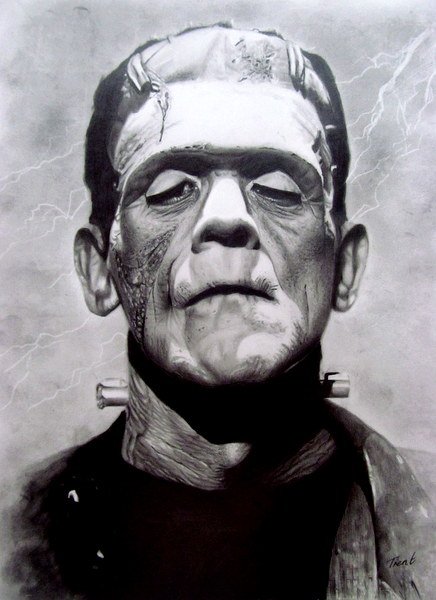The Singularity Has Already Happened
Let's say you decide to take a picture everyday since your birth. You line them up next to each other but you can't seem to notice any differences when you compare the photos before and after each day. If you take a picture from year 3 and compare it to a picture from year 5, then you start noticing some differences. The greater the time-length between the shots the greater the differences.
It seems that pop-culture with it's tv themes and science fiction stories has drilled so hard into our perception that has made us oblivious to subtle changes like the one aforementioned. Gradually, since the Enlightenment, we seem to have replaced popular themes of religion, immortality and perfection with those of technological singularity without even realizing it.
Whether we are religious or not we all seem to entertain the same pathos for revolutionizing our very nature into an immortal all powerful perfection. We want to transfer our bodies and souls to machines and vice versa. We want to live forever and be able to experience everything. We want to be Gods.
An average human being with no medical advancement lives only to be 33-35 years old. We have gone way beyond that age with the help of technology. Think about it. No other species on this earth can take metals from the ground and build machines that can aid its biological function. This is pretty awesome by itself even if we take it for granted. This is the very definition of singularity. This is how one can define a cyborg. We are in a sense A.I. that has reached singularity — just not exactly meeting Hollywood's standards.
The A.I idea has been marketed with people being oblivious to the aforementioned photo-a-day parallelism. Much like biological evolution, it is hard to envision all the small steps, the tiny alternations that really take place in order to complete a complete sequential image. From Elon's Musk neural lace to Kurzwell's singularity we seem to lose point of the whole argument.
What exactly do we seek when we want to reach singularity? If the point is our accomplishments and legacy then books, family and memorials do the job very well. If the point is to experience more and more then we are already doing it by living up to 90 years old — even if by the time we are 60 we would have forgotten or completely replaced more than 75% of our lives with false memories. If our wish it to have back-ups then we have computers that do just that. If we want to live as others then we have virtual reality.
We are already cyborg'ed whether this is our 3D printed organs, our metal heart pumps, our plastic limb prosthetics or our audiovisual implants. The A.I integration, much like it was envisioned from Mary Shelley's Frankenstein took a slow, seamless evolution, almost unnoticeable to the historical eye. Where this will end nobody knows.
We have no idea what a "proper A.I" is other than what our imagination's limitation has imposed onto us. Humans always like to entertain ideas beyond their scope because it helps them cope with their inevitable mortality. We are doing this constantly whether it has to do with concepts of creativity, religion, love or our own dreams and aspirations for the future. Much like most things we do in life we seem to forget the point of it all. If we are all immortal and all powerful who exactly are we exactly trying to impress?



There are two separate issues, one being transhumanism, in other words the enhancement of human biology with technological infusion, and the other the progress of AI to a point where it becomes smarter than the human intellect and then self-accelerates its learning by teaching itself. Transhumanism has yet to come, while AI is increasingly being able to compete with humans in intellectual tasks. Though, for the time, this is for specially trained AI and only in certain categories. For example, an AI that beats humans in an online game is not something as broad in its use cases to be perceived as "the singularity".
Smart AI is, in a sense, the force that could power all the machines that are needed to make society work, thus reducing or eliminating the need for workers. That is definitely a bigger real life motive than transhumanism.
There are plenty of devices in humans that do qualify as transhumanist addons. I mention them in the post.
Both transhumanism and singularity are treated scientifically as part of the same problem.
Never in history technology has resulted in less work. With the advancement of the computers we actually work more, we are more and more busy, produce more and multitask even more than ever before.
It is a myth that technology reduces labour or eliminates jobs. Since the industrial evolution the amount of jobs has exponentially risen and leisure time has been significantly reduced.
History in this case is no indication of what's gonna happen in the future. Machines evolved but they always needed human operators. Self-operating machines are a game changer and obviously will need drastically less human operators.
Self operating machines means that more jobs like "social media manager" and "occupational psychologist" are going to pop up.
Much like someone in the 1850's could not have envisioned that people would actually die from overworking in front of a glass that emits light (computer induced stressed work e.g in Japan) in the same way you can't even fathom the ways we will busy ourselves when we are all free from manual labour (which is not a bad thing).
One thing is for sure; technology has a positive correlation with occupation. Why? Simple. Every problem solved creates a series of other problems. Exponentially. It is how an evolving universe functions and we are caught in this rat race trying to catch up with ourselves.
The problem was never manual labour. That's pointless. Heck it is good to move around considering we are practically dying sitting on our asses.
But hasn't there also been a shift in what is needed to get and hold a job? What about those that for whatever reason can't be trained or educated towards the new jobs that pop up after the jobs for the moderately or unskilled workers have been automated away, the not-so smart? They don't disappear along with the unskilled jobs.
Don't these other problems become more and more complex, so that fewer and fewer people can solve them?
!! +1 !!
It sure has!
I've been reading Gerd Leonhard's stuff recently and seems to be a good conversation, sort of like a counter-argument for a Kurzweillian future..
Besides some science fiction authors that got a couple of things right (due to the sheer abundance of their prophesies) we have never been able to predict the future because simply we cannot take all the parametres into consideration.
I think both of them get the idea of the future wrong. Remember. There are science fiction movies of the 90's that portray 2010's with flying cars, A.I and all the other goodies. What we got instead? Plenty of hypes with little to no use. People thought for example that having a see through fridge would save us the trouble from opening it. Little did we know that the idea would fail since nobody is comfortable sharing their mess inside the fridge.
Part of the problem is that we are not honest with our deepest desires. We are self centered, egotistic but like to see ourselves more like altruists, kind, trying to make a world a better place. Sure we do try to accomplish something bigger than us (if we manage to get the basic ego satisfactions in life) but very few end up doing so.
Everything made is for the common folk. The average user. The only correct prediction I see for the future is Idiocracy. We be building more and more virtual reality spaces, more and more basic cyborgs to fuck and date. We will make our houses prisons that we won't have to leave for anything.
Idiocracy is already here, in a way. I wonder how the technological developments correlate with the number of people with at least a basic clue about how their latest toys work. Most can't even change a car tyre or describe what a car's gearbox does.
There is even a school of self-declared intellectuals, especially in arts and literature, who pride themselves on knowing nothing about math and technology. They are in fact admitting they haven't got a clue about much what is happening in the world, yet they somehow find this ennobling.
Not sure if I've read anything back then that indicated this in some pretty decently reasoned-out book or it was just portrayed simply as scifi.
One of the most possible paths but still only a prediction, plus there'd always be a counter-culture..
Are you OK?
Very interesting perspective, loved reading it. Singularity is basically point of no return and growth( or possibility of changes) crosses from linear curve to exponential curve. Infact it has already happened biologically, the question is technological singularity is happening currently? I would say yes.